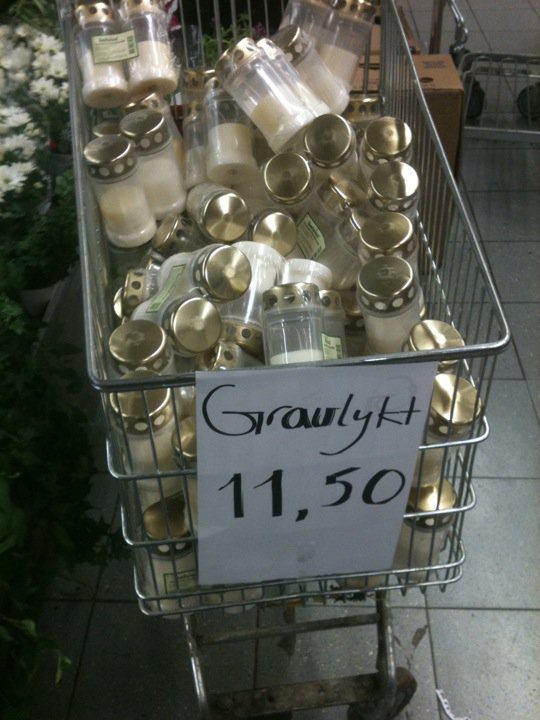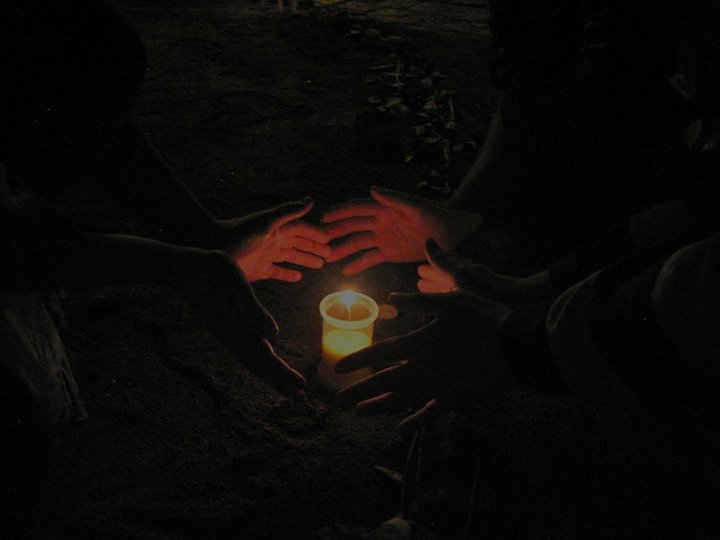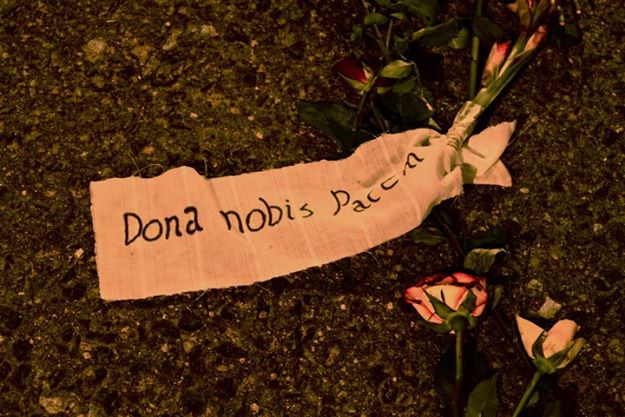As a professor of Norwegian language and culture, I am often asked about my experiences in Norway. Many of the experiences I have had in Norway in and Norwegian-America have shaped my life in meaningful ways, which is part of the reason why I love what I do for a living. I’ve lived in Norway for approximately four years; it’s my second home. I feel connected especially to Oslo, which is where I’ve spent a majority of my time in Norway. The main reason I feel at home here is that I am fortunate to have many loved ones in Oslo, both friends and family and friends whose families have become my Norwegian family. The events that have happened over the last few days are no exception to how Norway and weegies (what I lovingly call Norwegians) have deeply impacted my life or why I feel at home.
So many of you have asked how I am, how (and if) I am dealing, how those around me are, if my loved ones have lost their loved ones, what the mood in Norway and in Oslo is like, etc. For some of you, I am your sole connection to contemporary Norway, and you look to me for your 411. Others of you are just as connected to this little country as I am and are trying to understand what is going on here from afar. It’s been difficult to find words to describe what has happened to me and also to the weegies I’m surrounded by. This is partially because for the last week I haven’t been capable of doing much more than just making it through the day; each day has been filled with uncertainty, confusion, and tears. I stood a mere block away from the bombing 30 minutes before it happened, which still seems a little too close for comfort. It has also been difficult to find words because communication has, for the most part, been via short, superficial emails and Facebook updates, where it is difficult to reflect in a meaningful way.
Jens Stoltenberg, the Prime Minister of Norway, has said that there was a Norway before July 22nd and that there will be a new Norway after July 22nd. The uncertainty of how this will play out has been frightening for some, including me. Over the past few days I have seen glimpses of what I think is at the core of the new Norway. I’ve also talked with a number of loved ones here in Oslo and know that my experiences, including the one written below, are similar to theirs. It’s uncertain yet if the what we’ve experienced just happened as the aftermath of tragedy and will slowly return back to what once was, or if these changes are the new normal.
Sunday, July 24th 2011: I got up, watched the morning news, the beginning of a moving church service on TV and then met a friend for coffee in Grunnerløkka. We enjoyed a long chat over coffee, which included how we were feeling about the past few days. It felt good to talk with yet another friend over coffee. Like you do in Norway.
To get back to my apartment, I took a streetcar, which took a route through downtown and then through Frogner, one of the richest areas of Oslo. When we were downtown, a drug addict couple came and sat across the aisle, facing me. The woman was pretty obnoxious. She was trying to write a text message, saying each letter out loud before pushing the corresponding button. As she slowly pushed each button her cell beeped loudly. As a side-note for those not familiar with Norwegian culture, drug addicts are commonly seen but, like everyone else, are almost always ignored; loud beeping cell phones are a major no-no.
The streetcar then took a sharp swing and although she was sitting, she lost her balance and her head would have hit the metal part of the seat across the aisle had a woman sitting across and behind her not been paying close attention. That woman put her hand out on the metal part of the seat so the addict wouldn’t hurt herself. The woman, directly across from her and in front of me caught her. The woman, the one across from me, is what is called a frognerfrue: a well-to-do woman from the Frogner area. I could just tell by the clothes she was wearing, how tan she was and the way her hair was cut. Normally a frognerfrue would likely say something like “jøjemeg,” which is like saying, “oh goodness gracious,” and be grossed out that an addict was touching her. At least that is the stereotype many have of a frognerfrue. But this woman wasn’t living up to the stereotype. She dawned a loving smile, and asked the woman if she was OK. Then there were nice exchanges between all three of them. They were talking. To each other. On a streetcar. In Norway. And no booze was involved.
For someone who hasn’t lived or visited Norway, this may sound totally absurd, but you just don’t do something as crazy as talk to people you don’t know, at least not in public and especially not on public transportation. Weegies talk openly with their loved ones, but many feel that sincerity is lost in conversations with strangers. Well, a guy did talk to me the other day on the bus. He was asked me to not write him off as a lover just because he was sneezing; he wasn’t really sick, he’d be just as good of a lover with allergies, he explained. I think you get the picture.
Anyway, back to the culture shock. The streetcar drove on, the woman fell over yet another time, had another conversation with the frognerfrue and continued to beep her cell phone loudly and annoyingly. Once outside, the addict couple suddenly worried that they might have forgotten something on their seat. So, they cupped their hands together against the window and looked in before it drove off. And I smiled because it was one part funny, one part touching. We drove on and the woman across from me saw my smile and smiled back. Yes, she smiled. She showed me her teeth. I not only made eye contact with a stranger, but I also smiled back. I had just crossed a Norwegian line I was taught never to cross. Then I figured, what the helvete, I crossed the line already, I might as well continue. So I looked at her and said that I thought it must be difficult to live such a life. She nodded and said thoughtfully said that she couldn’t even imagine. Well of course, you can’t, you live in sheltered little Frogner, I thought to myself skeptically, thinking of all of the frognerfrue stereotypes.
In the first press conference late Friday evening, Jens Stoltenberg’s message was clear. Weegies need to show compassion for each other in this difficult time, understanding that everyone will cope, mourn and have different needs. Weegies need to reach out to each other. It is a message that has been reiterated in the media time and time again. The experience on the streetcar illustrated to me just how Norwegians are taking his message to heart. To someone who hasn’t lived in Norway, this example might not even seem like an example of compassion, it might seem absurd. It might not even seem worthy of writing about. But the Norway before 7/22 was one rooted in the idea that family and friends should be valued, loved and prioritized, but caution is shown with strangers.
We arrived in Frogner, the frognerfrue got up and said that this was her stop, ha det bra, goodbye. And she said it with a smile. W.H.O.A. First let me just say that, see, I know my Norwegian stereotypes. But, seriously, she just made a point to say goodbye to me. A stranger. In Norway. I was in shock and disbelief all over again. It is a simple act really, but it moved me. Weegies just don’t go throwing around greetings like we do in the States. I was touched that I was significant enough to her that she wanted to note that we were parting ways.
Now, as I’m sitting here at an outdoor coffee shop writing this, I was interrupted by an older man who asked if I was Facebooking so early in the morning, before reading the news. No, I told him, I was working. Ahh, that’s no good, he said, one should always start the day with the news and a good cup of coffee. I assured him that I had, it’s just that I was up so early. And then the coffee hit me. I’m still in Norway and this nice weegie just made small talk with me. Another example of people talking. To each other. To strangers.
When the streetcar arrived at the next stop the other woman sitting across from me who hadn’t said a word up until now—maybe feeling a little left out by not being included as one of our new bffs—made eye contact, smiled and nodded as she got up to get off. I had to remind myself that, yes, this is Frogner.
When the streetcar came to my stop, I got off and started walking home, trying to make sense of what just happened. But my thoughts were suddenly interrupted by a loud siren and bright flashing lights of two heavily armed military hummers, a bus of military personnel and several police cars. I stopped walking and just looked at the scene. This had been a common sight many times over the past few days. For the first time, I didn’t look in disbelief, I was starting to get very used to an intense military presence. What once seemed so safe and familiar now seems so different. Is this the new normal?
I continued my walk home, almost bumping into a man on the street. He was working at the flower shop and was busily filling a truck with flower arrangements, undoubtedly preparing for a long day of deliveries to those in mourning. I walk by a coffee shop where I briefly overhear two men trying to make sense of a life lost at Utøya. A steady stream of police officers walk in for a to-go cup, needing any extra energy the caffeine can supply. A woman walks by me talking on her cell, face covered in tears, but smiling. Passersby make eye contact, wanting her to know that they care. Walking into the grocery store to buy something to drink, I am greeted by a grocery cart full of grave candles. All are constant reminders that all weegies have been forever changed.
As I continue down the street, I think about whether I’ll ever be able to return home to the Norway that once seemed familiar, the one I held close to my heart. I hear seagulls and look up and see sunlight peaking through the clouds. The sol is making every effort to shine through the dark clouds. Ever since my arrival, weegies have been reporting that it’s been a horrible summer with brief glimpses of sunlight. During the darkest days of the summer, the darkest days since WWII, they find solace in each other. Weegies have never taken the sol for granted, sometimes it is just valued and appreciated more than other times. They are finding their sol, a ray of hope, in the eyes of strangers who are experiencing a tragedy, together. I find solace in experiencing and reflecting on the transformation to the new Norway with the weegies in Oslo.
Jens Stoltenberg was right, it is a new Norway, but maybe that isn’t all bad after all.


